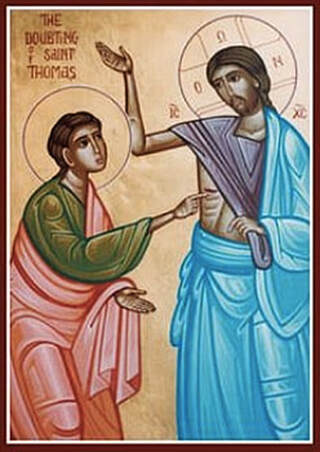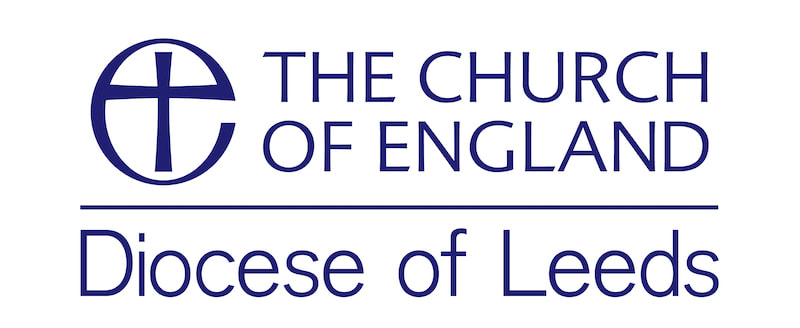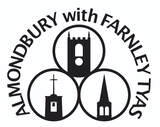 By Jessica Malay ‘We have seen the Lord.’ What a joyous proclamation, a proclamation that brought into being the Christian religion. These people in the upper room, these disciples that in their entirety numbered a little over 100, that remained openly faithful to Christ in those early days, are our forefathers and mothers in faith. 'We have seen the Lord’, the question is, what did they see? This is the question that Thomas asks when he arrives in the upper room. I can imagine Thomas feeling quite angry at this moment of his return, the anger palpable in his response to his friends: ‘Unless I see the mark of the nails in his hands, and put my finger in the mark of the nails and my hand in his side, I will not believe’. This is a pretty strong statement, and a very offensive one. What he is actually saying of course is that he will never believe that Jesus lives. This is the same Thomas, remember, that said he would go and die with Jesus. You can hear the pain of what he sees as Jesus’s betrayal of him. His sense that Jesus abandoned him, that Thomas’s own failure to live up to his commitments, his own knowledge of his weak faith hangs so heavily upon him, that it becomes too painful for him to believe that Jesus really was the Christ, because that would mean he had betrayed Christ. Like the other male disciples, he hid after Jesus’s arrest. Who knows where he was? He separated himself from the other disciples and hid away, likely terrified that he really would be asked to die for Christ. When we do wrong to those we love, the pain is often so great that we turn on the very people we have hurt and hurt them more. Thomas is not only, yet again, betraying Christ, he is deeply wounding his friends in his attempt to cast doubt on their knowledge, their joy. He is attempting to bring them back to the despair he continues to feel. He tries to drag them down with him. We do not know what their reaction to Thomas was, but clearly they did not cast him out. It's not a coincidence that John records the gift of the Holy Spirit coming to each of the men and women disciples just before Thomas enters. The Holy Spirit helped them to forgive Thomas, and helped them to draw Thomas back into their community. This is a good example, one of the great examples, of the way in which God, through our Lord Jesus Christ, never gives up on us, and empowers each of us to help those in pain and grief, empowering us to forgive and to continue to help even those that hurt us. Whatever the disciples in the upper room did, they continued to support Thomas, they continued to invite him into their sure knowledge of the risen Lord. And Thomas does return, and Jesus greeted him, as he greets us, full of love. Thomas repents of his unbelief, he does not violate Christ’s body by insisted on touching the wounds – what a horrible thing to suggest. He sees Jesus, and just knows. I have always envied those disciples of Christ who were graced with his bodily presence. What would it have been like to walk with our Lord on the roads and byways of Palestine? What would it have been like to sit at his feet and listen to his words? We all, I think, long to ‘touch’ Jesus, to experience his physical form near us. And doesn’t always annoy and offend us when people who are antagonistic towards the idea of Jesus Christ as our saviour constantly say, ‘I only believe in things I can see’ How very Thomas of them, and how very limiting, and how they deny that which Christ longs to give them, to have life and to have it more abundantly. And its our job, helped by the holy spirit, to continue to love them, and to show them our Lord Jesus Christ in our words and in our actions. We who believe though we have not seen, are indeed truly blessed. But let's not for one moment think that we are superior. Jesus meets all of us, where we are, in our joys and in our despair. I have been reading the memoir of Charles Raven, a theologian and a naturalist, of the early 20th century. He describes the moment he met Christ as a young man, that moment that transformed him from a man of profound doubts, to a worshipper of Christ. Charles was working in Liverpool, for the council in the Education department, in a year's break before he went back to Cambridge for his higher degree in about 1909. On one afternoon he went to visit a friend who was a curate in a parish in Stoke on Trent. Raven was clearly not impressed by this city, writing ‘For brute ugliness Stoke and its vast and dismal churchyard stand unique.’ Any yet it was here that he met Christ, he writes, ‘My friend was ill: I wandered up to his rooms alone, and the grim tragedy of the place struck me cold with misery. My friend loved the country, and music, and all beautiful things: and he was living in this hell. I found him and behold he was not alone. No other other phrase will express it. Here walking with him in the midst of the furnace was Jesus…He had found that which together we had sought…in the mean streets, God…met me in splendour.’ (A Wanderer’s Way, p. 83). The rest of Raven’s memoir is a working out of what this meeting meant to him, how he was transformed, and how his life became, even in the darkest times in the trenches of France, a life more abundant. I think we can all relate to the truth of Raven’s experience. How many times have we met Jesus and known it? How many times has Jesus stood with us as a presence that has upheld us in times of grief, and gifted us times of incredible joy? In those times, there is no other response, but Thomas’s response: ‘My Lord and My God’. It's good to remember as the country moves into a period of mourning, that Jesus is always with us, even when we are too angry and too hurt to see it. This is what Thomas learned, and was healed.
0 Comments
Leave a Reply. |
Archives
August 2022
Categories |
|
|
|

